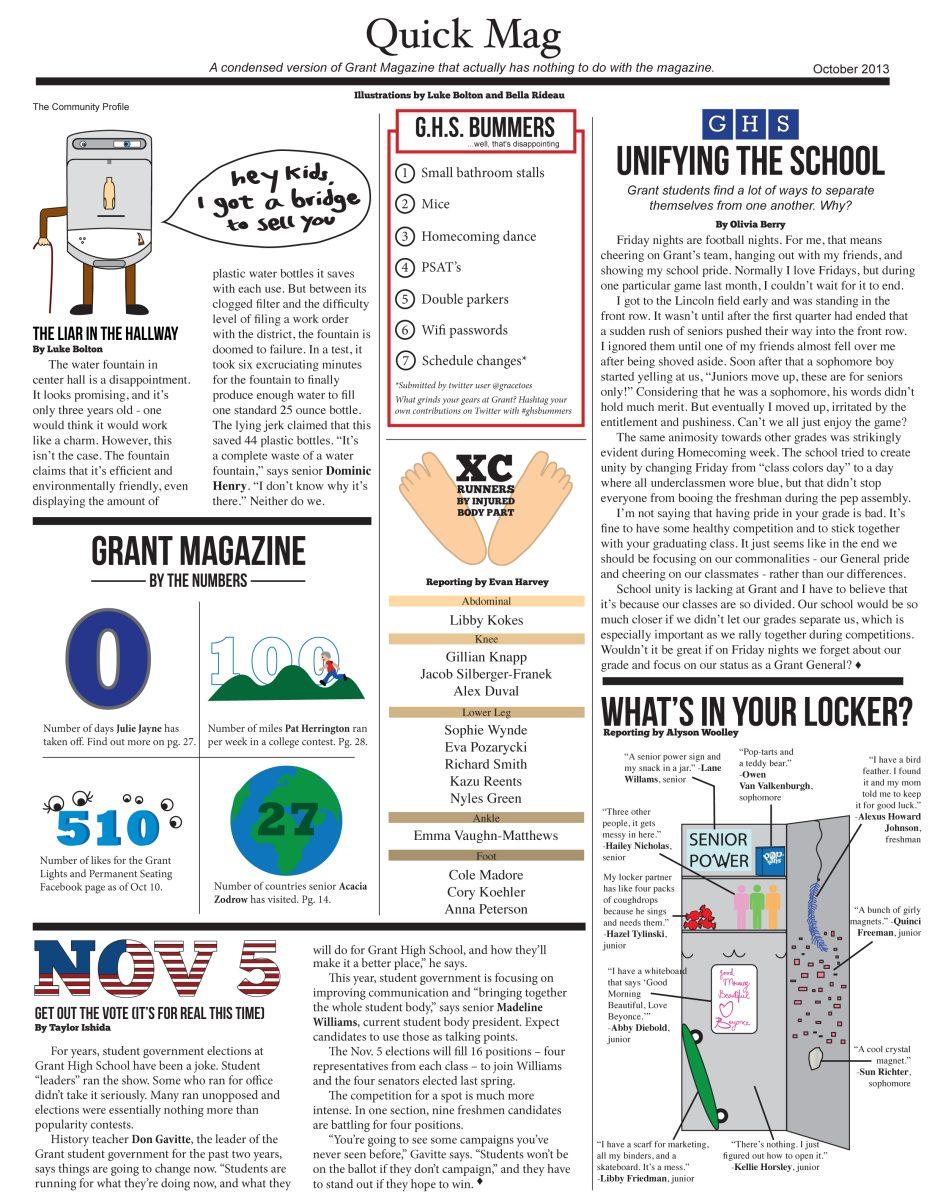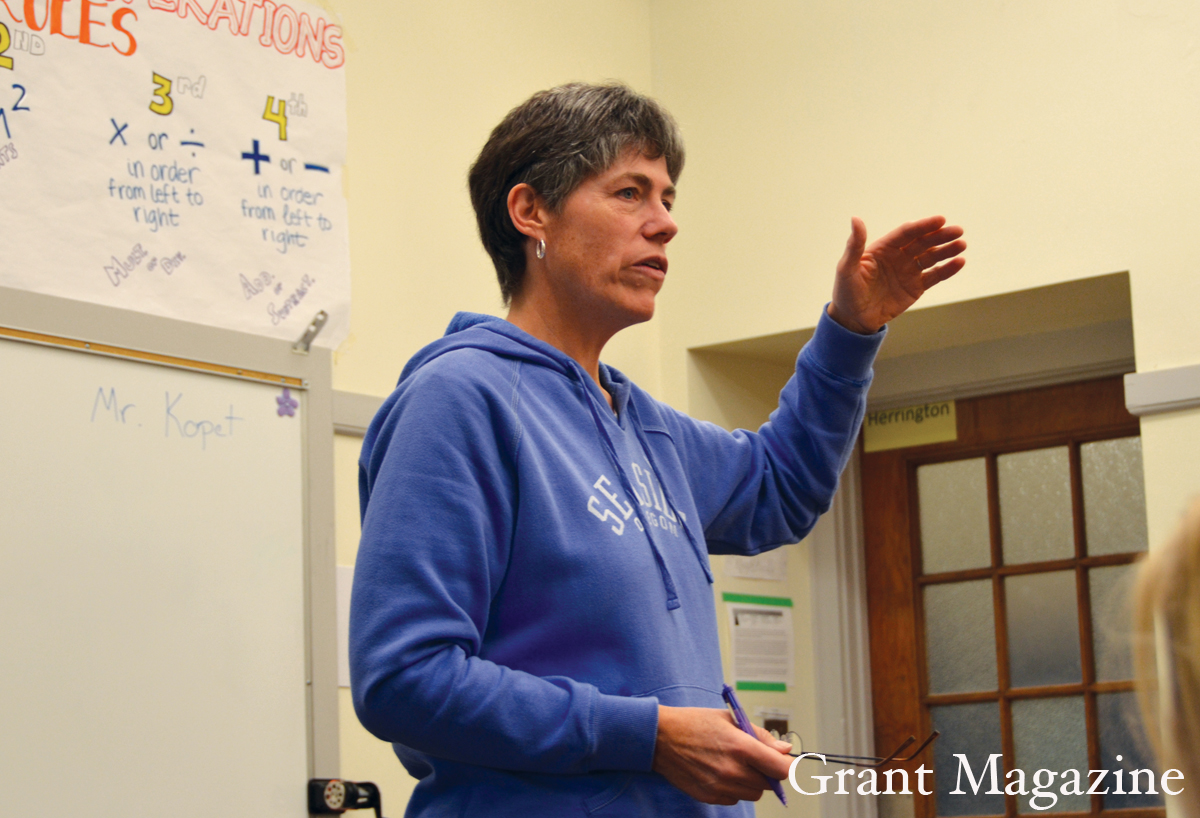At 7:05 a.m., Grant High School senior Sarah Webster starts her morning routine. She showers and dresses, but most importantly, she prepares herself a balanced breakfast.
Webster, 18, builds her meals around one “base” item, which for her is most often some source of protein. “In the morning it’s usually eggs, protein powder mixed into something, or Greek yogurt,” Webster says.
In contrast, Grant sophomore Harrison Schrage starts his day rushing out the door. With little time to prepare food for himself in the mornings, he’ll normally grab any easy-access, tasty snack on his way out. Schrage, 16, says his snacks normally consist of “random stuff like chips and ice cream.” All too often, he finds himself going to class on an empty stomach.
Webster wasn’t always as concerned about her nutrition. It wasn’t until freshman year that she started making changes to her diet. She had a goal to amp up her athletic abilities and thought unhealthy eating habits would be a hindrance. As a result, she started paying more attention to nutrition, cutting out refined sugars and highly processed foods. She says making the switch to a healthier diet improved both her athletic and academic abilities.
Meanwhile, Schrage appears to excel in his athletics while maintaining an unbalanced diet. He is one of the few sophomores to make Grant’s boys varsity soccer team and he’s a highly ranked junior Olympian in track. The question is, does one’s performance in school and athletics truly depend on proper nutrition?
We always hear that breakfast is the most important meal of the day. But what makes it so important?
Upon waking up, it’s usually been several hours since our most recent meal – dinner. Because our bodies haven’t had any new food to process into energy, we’re almost completely drained of the only form of easily accessible energy our brains can operate with – glucose. This explains the typical groggy state of mind and grumpy mood that many of us experience in the morning. Starting your day without breakfast will only be a disadvantage to you, especially if you’re not a morning person.
Suzanne Ahn, a nationally certified family nurse practitioner who works at Grant’s School-Based Health Center, explains: “Your brain uses more glucose than any other organ in the body – that’s what keeps you thinking. Just like a car needs gas, you need food for your brain, or it will not function.”
Skipping meals like breakfast or lunch can cause students to be tired, unfocused and anxious during class. Grant senior George Grenham, who is on the varsity cross country and track teams, knows to never go to class on an empty stomach. “I can’t focus when I’m hungry,” says Grenham, 17.
Pat Herrington, a pre-calculus teacher and track coach at Grant, explains skipping meals can lead to poor food-related choices that reflect negatively in school and sports. On top of struggling with focus from our brain’s lack of glucose, it’s common for hungry people to eat unhealthily when they finally get the chance to eat.
She says “it makes it extremely difficult to perform at your highest level if you’re skipping meals and not eating good foods.”
As Herrington suggests, it’s not just about how frequently you eat. In order for food energy to actually sustain throughout classes, students need to fuel their bodies with the proper nutrients.
Sophomore Lile Kalamafoni’s breakfast of choice is a bowl of sugary Trix cereal. She chooses the cereal for its flavor and convenience more than its potential health benefits. Kalamafoni, 14, admits that her daily Trix breakfast doesn’t always keep her completely charged throughout class. She says focusing in school is one of her biggest challenges.
Valerie Edwards, a clinical dietitian at Providence Medical Center in Portland, says that eating a breakfast of only carbohydrates (like sugary cereals) in the morning will only give your brain fuel for about two hours. She explains: “Proteins are absorbed slower and will fuel the brain longer.”
Ahn elaborates, explaining why students should minimize their intake of sugary breakfast cereals and treats in the morning. The processed sugars in these foods are simple carbs, meaning they are digested and absorbed much faster than more complex foods containing proteins.
Foods high in carbohydrates and low in protein will often cause spikes in energy levels that generally don’t sustain through classes all the way to lunch. Improving your daily eating habits by fueling your body with more nutritious foods gives you more energy and helps you focus better during class.
Today, after changing her diet, Webster’s been on Grant’s varsity track team doing shot put and discus for two years, and she also regularly runs and participates in Pilates and yoga classes.
“Changing my eating habits made a huge difference,” Webster says. Prior to her lifestyle switch, she didn’t want to push herself and never participated in any sports or athletics. “I think I was just too nervous that I would embarrass myself ‘cause I was so out of shape,” she says.
Changing the food she ate gave her confidence and an adequate source of energy that allowed her to push past old limitations.
Along with being able to reach her athletic goals, Webster says her healthy diet positively affected her scholastically, too. “Because I was more confident, I would participate more in class, and because I was eating right, I was more focused in class and less tired,” says Webster.
Despite what experts recommend, there are still those “super-humans” like Schrage that can excel while maintaining an unbalanced diet. He says he never really eats a full meal for breakfast or lunch, yet he is a regular A and B student who racked up the awards this past summer, placing second nationwide in the Junior Olympics for long jump, as well as first place regionally in long jump and triple jump.
Schrage has always had to put extra effort into focusing while in class and doing homework because he has attention deficit hyperactivity disorder. But he never considered that his diet could also be affecting him.
When Ahn and Edwards were asked how someone with unhealthy eating habits like Schrage could still be successful in school or sports, their responses were practically the same: they had both seen it before. If someone has only ever fueled his or her body one particular way – be it healthy or unhealthy – they don’t know the benefits or setbacks that their eating habits may be causing them because they haven’t tried eating any other ways.
For a competitive athlete like Schrage, improving nutrition could give that extra edge to push him ahead.
Will he try a different route?
“No,” Schrage says simply, “it’s a hassle. Maybe when I’m older but not for… now.” ♦








































